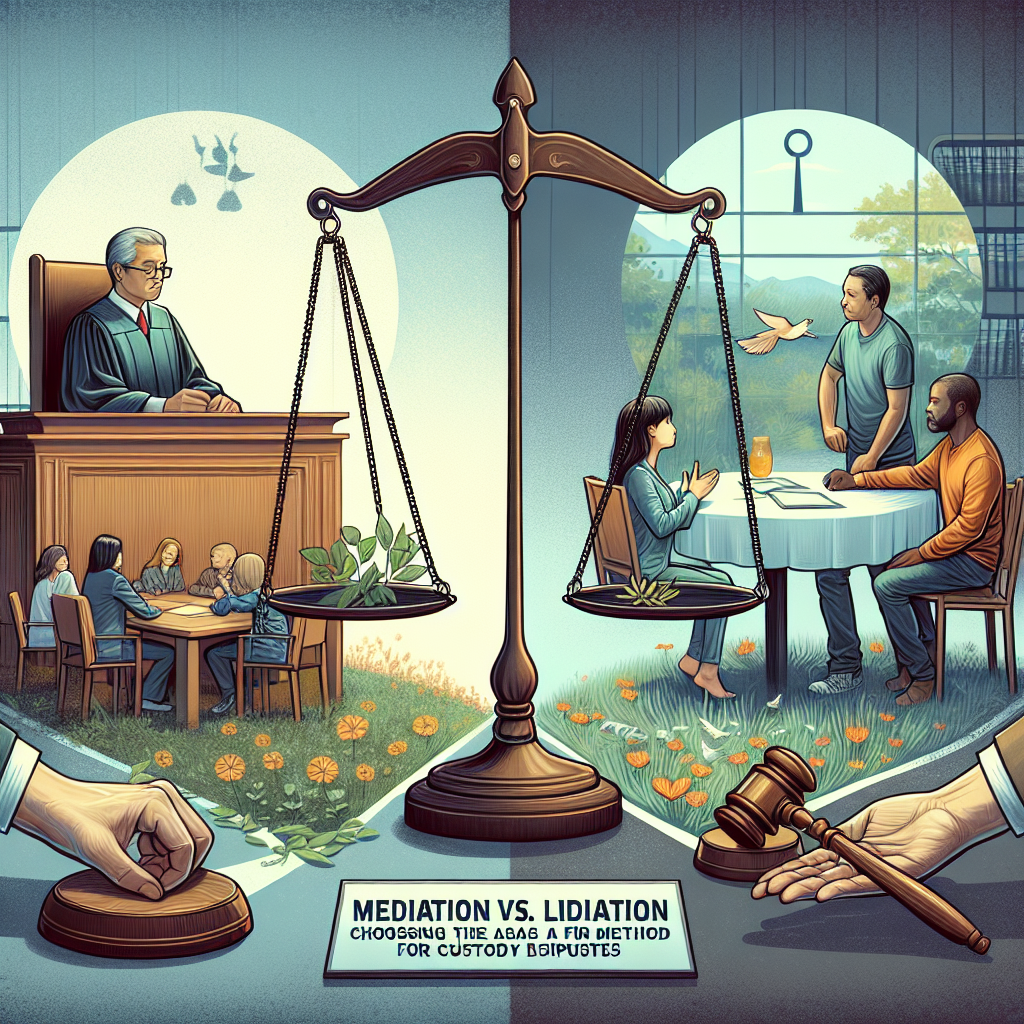When it comes to custody disputes, emotions can run high, and the stakes are incredibly personal. As parents grapple with the complexities of their separation or divorce, they face a crucial decision: should they pursue mediation or litigation? Understanding the advantages and disadvantages of each method can help you make an informed choice that best suits your family’s needs.
Understanding Custody Disputes: The Emotional Landscape
Custody disputes are often fraught with anxiety, fear, and uncertainty. Parents want what is best for their children, but differing perspectives can lead to heated conflicts. The choice between mediation and litigation can significantly influence not only the outcome of the custody arrangement but also the emotional well-being of the family involved.
What Is Mediation?
Mediation involves a neutral third party—often a trained mediator—who facilitates discussions between parents to help them reach a mutually acceptable agreement regarding custody and visitation. The mediator does not make decisions for the parents; instead, they guide the conversation, encouraging collaboration and compromise.
Benefits of Mediation
-
Cost-Effective: Mediation often costs less than litigation because it typically requires fewer hours and does not involve court fees.
-
Faster Resolution: Court dates can be scheduled months apart, while mediation can take place within a matter of weeks.
-
Less Adversarial: By promoting open communication and collaboration, mediation can reduce hostility between parents, which is beneficial for the children involved.
- More Control for Parents: In mediation, parents have a say in creating the custody arrangement that works for their family rather than leaving the decision to a judge.
When to Opt for Mediation
Mediation can be an excellent choice for parents who are willing to communicate, cooperate, and negotiate. If both parties have a shared goal of maintaining a healthy relationship for the sake of their child, mediation can be a productive and compassionate path forward.
What Is Litigation?
Litigation, on the other hand, is a formal legal process that involves taking a custody dispute to court. A judge will listen to both sides, review evidence, and ultimately make a binding decision on custody arrangements.
Advantages of Litigation
-
Legal Authority: Decisions made in court are legally binding and enforceable, which can provide a sense of finality.
-
Clear Guidelines: The court sets clear legal standards and guidelines based on the law, ensuring that all decisions are grounded in legal principles.
- Safeguard for Uncooperative Parties: If one parent is unwilling to cooperate, litigation offers a way to resolve the dispute through legal channels.
When to Consider Litigation
Litigation may be necessary in cases where there is a significant power imbalance, such as domestic violence, substance abuse, or severe parental alienation. In these situations, a neutral party (the court) is essential to ensure that the child’s safety and well-being are prioritized.
Weighing the Pros and Cons: Mediation vs. Litigation
When deciding which route to take, it is crucial to consider both the pros and cons of mediation and litigation.
Mediation: Pros and Cons
Pros:
- Cost-effective and quicker resolution.
- Focus on collaborative solution-making.
- Protects the parent-child relationship by reducing conflict.
Cons:
- May not be effective if one party is unwilling to negotiate.
- No guarantee of success; if mediation fails, litigation may still be necessary.
Litigation: Pros and Cons
Pros:
- Final and enforceable decisions made by a judge.
- Provides a formal setting for addressing serious concerns.
Cons:
- Time-consuming and expensive process.
- Adversarial nature can exacerbate conflict and negatively affect children.
Making the Right Choice for Your Family
Choosing between mediation and litigation isn’t a one-size-fits-all decision. It’s essential to reflect on your specific situation, including your relationship with the other parent, the presence of any personal safety concerns, and your willingness to engage in discussion and negotiation.
Seek Professional Guidance
It may be beneficial to consult with a legal professional who specializes in family law. They can provide insight into the dynamics of your particular case, as well as help you understand the potential outcomes of each method.
Conclusion: Prioritizing the Best Interests of Your Child
Ultimately, the choice between mediation and litigation boils down to what will best serve your child’s needs. Prioritizing open communication and collaboration can lead to constructive solutions, while, in some cases, legal intervention may be necessary to safeguard your family’s well-being. By weighing your options thoughtfully, you can take a step toward resolving custody disputes in the best way possible for your family.


